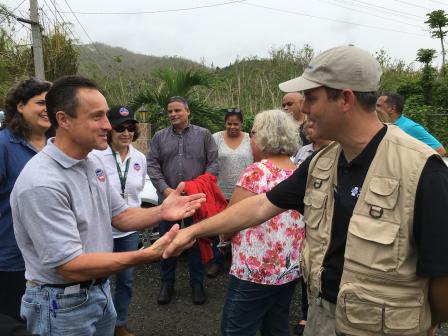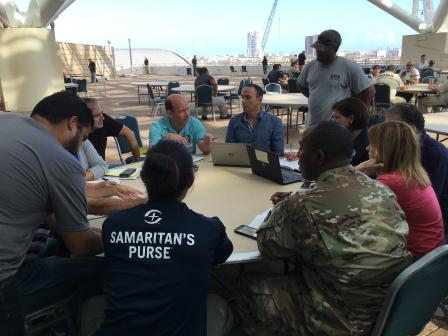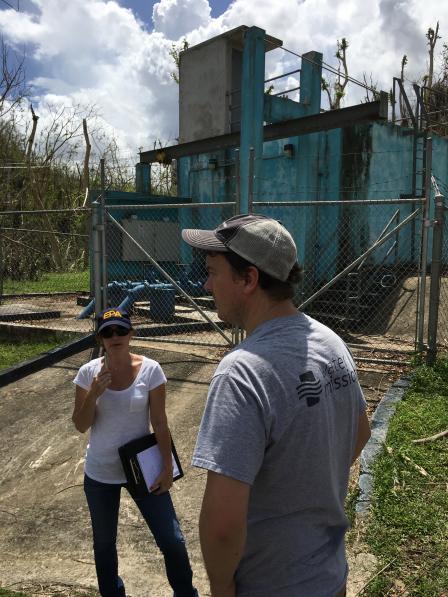News Releases from Headquarters›Land and Emergency Management (OLEM)
EPA Teams Up with Non-Governmental Organizations to Help Restore Drinking Water to Communities in Puerto Rico
SAN JUAN, Puerto Rico (December 12, 2017) – The U.S. Environmental Protection Agency (EPA) continues its overall response to Hurricanes Maria and Irma in close coordination with federal, commonwealth, and local partners. One EPA focus is restoring drinking water to small communities in Puerto Rico.
In addition to coordination with governmental entities, EPA has partnered with the non-governmental organizations Water Mission, Samaritan’s Purse, Project Hope, and RCAP Solutions to assist the estimated 76,000 Puerto Rico residents in over 200 communities across the island that rely on drinking water sources from pumps and wells and surface water that are not supplied by the Puerto Rico Aqueduct and Sewer Authority (PRASA). Approximately 237 of these small systems, commonly known as non-PRASA drinking water systems, provide drinking water to approximately three percent of the population of Puerto Rico. Government and non-governmental organizations are working together to repair damaged systems to provide generators and, in some cases, solar power to these systems. To date, solar panels have been installed on about four of these community drinking water systems with four more planned for completion before Christmas.
“Aqua es vida, water is life and by connecting communities to these organizations we can provide this critical resource to these communities, many of which are still without power due to the devastation of the hurricanes,” said Regional Administrator Pete Lopez. “Not only is this work helping in the immediate, it will provide for more resilient systems going forward, with the addition in some cases of solar panels to power these systems and make them independent from the power grid.”
 Regional Administrator Pete Lopez meeting with Water Mission representatives and residents at a Non-PRASA system community, Caguas, Puerto Rico.
Regional Administrator Pete Lopez meeting with Water Mission representatives and residents at a Non-PRASA system community, Caguas, Puerto Rico.
Multi-Agency teams, including non-governmental organizations, FEMA, the Puerto Rico Department of Health, the Puerto Rico Department of State, the Puerto Rico Environmental Quality Board, the U.S. Department of Health and Human Services, the U.S. Army Corps of Engineers, and EPA, have been deployed throughout the island (see video) to assess the needs of these often hard to reach communities.

EPA planning meeting with Samaritan’s Purse and other partners to discuss drinking water systems. San Juan, Puerto Rico

EPA and Water Mission representatives assessing an out of service drinking water system, Canabon, Puerto Rico.
From supplementing EPA’s assessments to providing direct relief via water treatment systems and facilitating generators, non-governmental organizations have come to the aid of people in non-PRASA drinking water systems that need drinking water restored.
Water Mission, a non-governmental organization that builds sustainable clean water solutions in developing countries and disaster areas, provided and deployed full water treatment systems for communities in dire need of clean water. They also provided solar panels and generators as a power source to get other water treatment systems operational.
Samaritan’s Purse, a non-governmental organization with dozens of disaster response specialists in Puerto Rico, established nine clean water points throughout the Caribbean and distributed chlorine tablets and jerrycans for smaller spot water purification.
Project HOPE, a non-governmental health crisis response organization, assisted with crucial logistics and engineering support and coordinated the delivery of water purification kits to families in Puerto Rico.
RCAP Solutions, a non-governmental organization helping people with housing and supportive services, was instrumental in conducting the first assessments and continues to do follow-up recovery actions within the non-PRASA systems.
Water Safety
In general, and out of an abundance of caution, EPA and local government agencies in Puerto Rico continue to recommend that people take precautions when coming in direct contact with waterbodies in Puerto Rico, including streams, rivers, and beaches because of the possibility of raw sewage being discharged into some water bodies.
Water contaminated with livestock waste, human sewage, chemicals, and other contaminants can lead to illness when used for drinking, bathing, and other hygiene activities. For information on making water safe in an emergency, go to the Center for Disease Control and Prevention’s Making Water Safe in an Emergency web page.
For more information and photos, visit EPA’s Hurricane Maria website and our Hurricane Maria Story Map.
# # #
